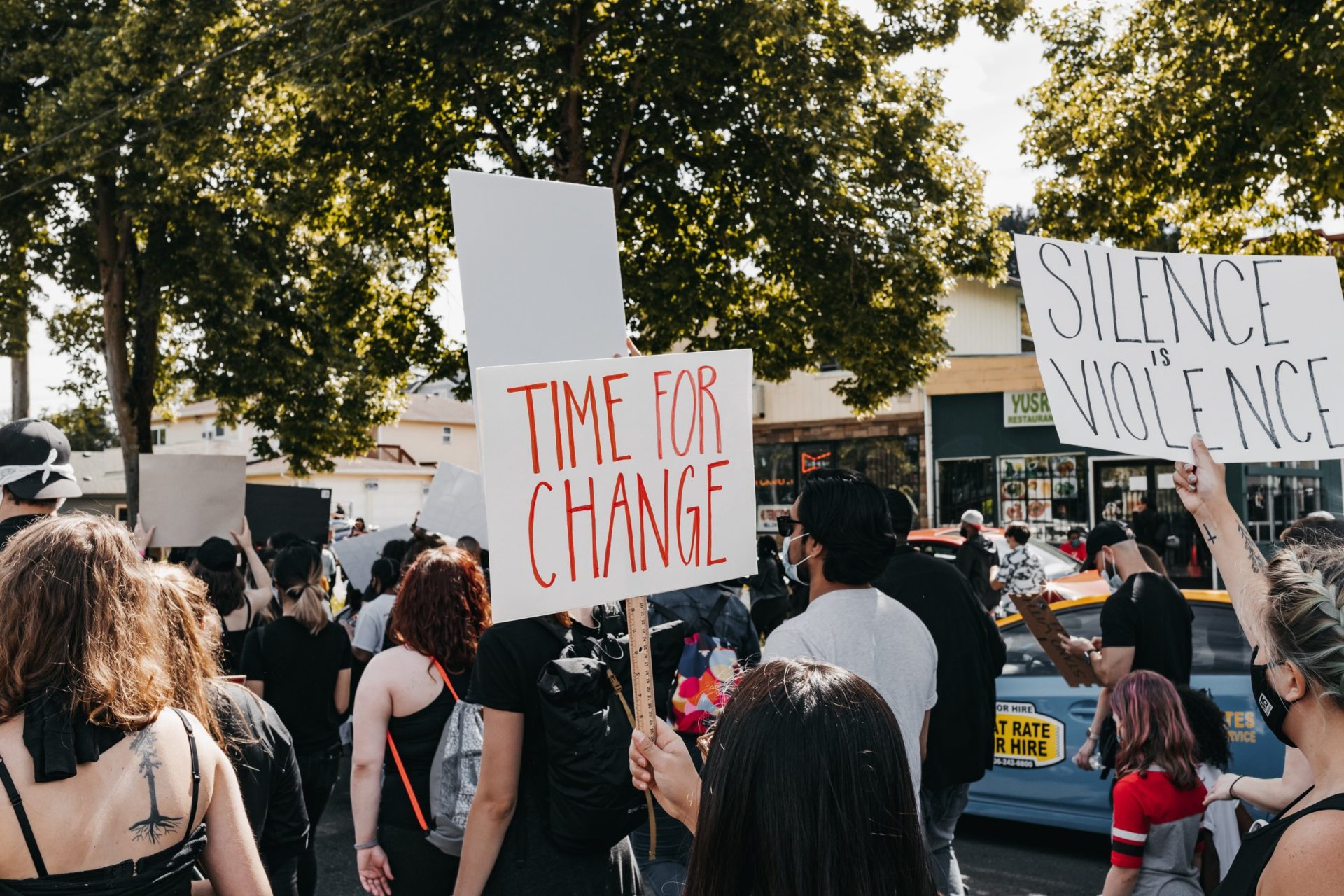
We live in a post-outrage world. More than two decades of media fragmentation, coupled with daily norm-shattering by Donald Trump, have desensitized voters from both scandalous behavior and scandalous policies. Demolishing laws that once enjoyed broad support across the political spectrum is no longer cataclysmic enough to move many voters.
Today, we can see how voters have become apathetic to dangerous policies that undermine decades of legal precedent and common decency. For instance, the Texas Heartbeat Act, which bans most abortion in that state before many women are even aware that they are pregnant, is among the most radical anti-choice laws in the land. Whole Women’s Health v. Texas, a case challenging the Texas law, was brought before the U.S. Supreme Court in October. On Friday, the justices allowed the law to remain in effect. Their decision sent up a trial balloon to gauge the political consequence of permitting such restrictive anti-choice legislation to exist in the real world and not just in the fevered dreams of the politicians who have been agitating for this outcome since the Court decided Roe v. Wade nearly five decades ago.
The justices did fail to act on the Texas abortion law in a vacuum. In early December, they would be taking up the Mississippi case of Dobbs v. Jackson Women’s Health Organization, a direct challenge to Roe v Wade. If the Texas decision did not stoke the kind of outrage that would make abortion rights the issue in our national dialogue, the Court could then dismantle those rights without fear of any negative consequences other than to its own legitimacy. For the majority of these justices, that is apparently an acceptable price to pay when weighed against the fact that they were confirmed precisely so they could overturn decades of legal precedent.
Most Americans recoil at the idea of forcing a survivor of sexual assault to bear her rapist’s child, especially if that rapist is also a family member. There is broad consensus on this, even when we disagree more generally about a woman’s right to choose. Nearly 80% of Americans believe that survivors of rape and incest should be able to terminate a pregnancy in the first trimester and a majority believe that they should be able to terminate even in the third trimester. In Texas, the vast majority of Republicans oppose banning abortion for survivors of rape or incest. Looking at these toplines alone, elected officials and party activists could be persuaded that politicians supporting these extremist policies are signing their own death warrants.
But a closer look at the data shows that even something as popular as protecting a survivor of rape and incest from delivering her assailant’s child is not enough to stir voters to the outrage necessary to sway elections. Only 24% of voters say that their candidate must support their views on abortion. For 75%, it is just one of several factors they consider or not a factor at all.
And in this lies the rub for so many progressives who hope that moral outrage will stoke voter turnout next November. There is a difference between policies that poll well and policies that get voters to the polls, although journalists, pundits, and even politicians broadly confuse the two.
How did we get to a place where so many elected officials do not think twice about supporting legislation that flies in the face of overwhelming public sentiment? Partly, it is due to a segmented media that is so driven by ratings that it needs to up the outrage meter on a daily basis, like a drug dealer providing an ever-stronger fix. Collapsing ice shelves, autocratic politicians, foreign policy blunders, the ongoing threat to our democracy – all of these compete with each other until they so overwhelm the consciousness that voters cannot psychologically absorb the sheer horror of any single one. Coupled with years of pandemic restrictions, most Americans are suffering from exhausting moral fatigue.
But more practically, voters do not appear to be sitting around worrying about the plight of others. For evidence of this, we need look no further than the recent gubernatorial election in New Jersey.
Earlier this year, I observed four statewide focus groups of primary Democratic voters. As the election cycle ground on, I became increasingly troubled by the message Governor Phil Murphy was conveying because it flew in the face of what members of his own base had expressed in these groups. Murphy was touting a Jersey renaissance that his own voters did not think existed. College-educated women reported feeling frustrated about the direction of the state. Latinas felt “uneasy” and “disappointed.” A non-college educated voter felt “pretty dismal.” Black voters were the most optimistic, but only because they were happy about President Biden’s recent election, not necessarily because their own state and local elected officials were delivering for them.
The pandemic took a toll on these people’s lives quite personally but their largest complaint was about its economic consequences. “We were looking to buy a house next year and we had a nice amount of savings. And it’s unfortunately, because of the pandemic, all gone,” said one Latina voter. “I buy chicken at the supermarket, which… isn’t good for you, but I got to cut the budget, right? We’re all doing that,” said another.
This went on and on. These Democrats all agreed that taxes were too high and the state was unaffordable. “[Taxes are] one of the reasons that I would look to move to another state where it’s more retirement friendly,” said a college-educated white woman. “I paid taxes up the wazoo but nothing to show for it,” said a Black man. “Up and up and up and up and up and we don’t get nothing back,” agreed a Latino voter. “No one should live in New Jersey unless they have to,” complained a college-educated man.
Most tellingly, these base Democratic voters took the issues they care about quite personally. Discussion about transportation turned to talk of how much it was costing to replace tires because of potholes along state roads. Discussion of health care accessibility turned to a discussion of how much each one spent on out-of-pocket costs.
Yet the governor chose to focus his messaging on hiking the millionaire’s tax, protecting a woman’s right to choose, and creating clean energy jobs. He took credit for making healthcare, childcare, and college more affordable. And, for good measure, he reminded them at every turn that he was not Donald Trump.
These issues all polled through the roof but they did not motivate these base Democratic voters. The participants in these focus groups supported hiking taxes on millionaires or protecting a woman’s right to choose but it was not something they lost a moment’s sleep thinking about – and therefore it was not going to get them to the polls. When they heard catchphrases like making college or healthcare more affordable, they were immediately skeptical because nothing about their own lives seemed affordable. And Trump was in their rear-view mirror. As a former president, he was no longer going to affect them in any meaningful way, so he was no longer personally meaningful to them.
These voters only cared about their own tangible circumstances. They wanted their own streets better protected. They were worried that their property taxes would go up the moment they fixed up their house. They were concerned about the rising cost of their commute. They were proud of the state’s public schools but lamented that they were too overcrowded for their own children to attend.
As the old adage goes, “all politics is local,” but that is no longer quite right. In fact, all politics is personal. Unless a particular issue affected these voters personally and viscerally, they did not get excited about it.
One week before the election, a poll showed Governor Murphy leading his Republican opponent by 11%. But when Murphy went to bed on Election Night, the race was too close to call. In the end, he barely eked out re-election by just a few points – in no small part because there are a million more Democrats than Republicans registered to vote in New Jersey. The governor’s reverse coattails were even more devastating to down-ballot candidates whose districts do not enjoy such a lopsided party registration advantage, with Democrats losing a whopping net seven legislative seats.
Democrats would do well to stop treating polling toplines as gospel. We should stop asking voters to opine about issues we consider important and ask instead about issues they consider important enough to cast a ballot for or against, without any preconceived notions. Otherwise, we will continue to receive false positives and confuse issues that poll well with issues that actually get voters to the polls.
Forcing a woman or a young girl to carry her rapist’s baby to term is outrageous. But as much as I wish that it motivated voters to vote, it does not. Most people express sympathy with that rape victim but they do not think they know her. She is not their daughter or their wife or their mother – even though she so often is. And unless we can convince voters to feel something viscerally, they will not bother casting a vote because of it. A candidate earns votes through precise messaging that speaks to constituents on their own terms, not in generalities or platitudes to which they cannot personally relate.
The only thing that most voters are outraged about is their own plight in life. We can wish that away. We can shoot the messenger. But then we should not be surprised when, like Governor Phil Murphy of New Jersey, we wake up on Election Day with what we thought was a sizable lead, only to watch it nearly vanish by the times the polls close that night.
Julie Roginsky
Julie Roginsky is the founding partner of Comprehensive Communications Group and has two decades of public and private sector experience as an adviser on strategic communications, political strategy and public relations.
Julie’s expertise is grounded in her work on behalf of corporate and political clients. She has advised Fortune 500 companies, start-ups, non-profits and dozens of elected officials, including Governor Philip Murphy, Senators Cory Booker and Frank Lautenberg, members of the House of Representatives and state legislators.
Julie is the co-founder of Lift Our Voices, a national organization dedicated to transforming the American workplace by banning forced arbitration clauses and non-disclosure agreements for toxic workplace issues. She is a former contributor at Fox News Channel, where she was a frequent co-host of Outnumbered and The Five. Prior to that, she was a contributor at CNBC, the nation’s most watched financial news network. She previously served on the Board of Directors of the Women’s Campaign School at Yale University.
She received both her B.A. and her M.A. with honors from Boston University.







